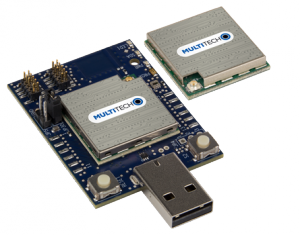The Client had an existing first-generation product - an IoT node with various sensors, LoRaWAN communication, control outputs, and the capability to configure autonomous local actions on the outputs in response to events detected by the sensors.
The Client approached us to assist in developing the firmware for a second-generation product. The new hardware platform was based on the MultiTech xDot, and Sensors included
- GPS
- Accelerometer
- Temperature
- Humidity
A push-button switch, digital Outputs, LED indicators, and a serial port were also available.
The first task was to design a suitable protocol for both the remote configuration of the unit, and the reporting of the sensor data & events to the back-end systems. The configuration needed to support the local detection of "events" based on the sensor readings, and linking these to automatic responses - independent of the back-end system. The inherent latencies of LoRaWAN meant that it was not practical to simply report data to the back-end system, have it decide on any reactions, and then command the unit accordingly.

